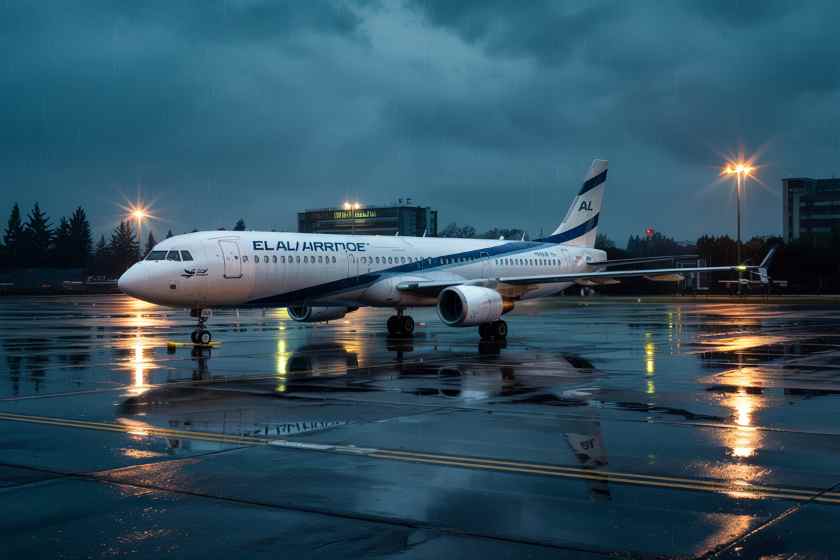Home » AIRLINE NEWS » Now, Tourists Can Now Travel Seamlessly Between Tel Aviv and Eilat with El Al’s New Domestic Service
Published on
August 22, 2025
El Al, Israel’s leading airline, plans to restart domestic flights in late 2025, bringing internal air travel back into its business for the first time in decades. The airline’s comeback will begin with the key Tel Aviv-Eilat route, linking Ben Gurion Airport (TLV) in Tel Aviv with Ramon Airport near Eilat, the gateway to the Red Sea resorts and vibrant tourist scene. This corridor has long been Israel’s busiest domestic route, and El Al’s return will shift the competitive landscape against current operators Arkia and Israir.
Adding domestic flights will give both tourists and residents a quicker, smoother way to travel between Tel Aviv and Eilat, making the southern resorts and cultural sights easier to reach. The new service will also fuel the growth of Israel’s tourism market, bringing more travelers to Eilat’s famous hotels, beaches, and nearby attractions.
Boosting Tourism in Eilat with New Flights
Eilat sits at the southern tip of Israel right on the Red Sea, and it’s famous for its stunning beaches, world-class diving, and warm sun year-round. El Al’s decision to relaunch flights between Tel Aviv and Eilat means that tourists and business travelers can get here faster and with less hassle. These flights aren’t just for locals; they also give international arrivals—who usually land in Tel Aviv and then travel to Israel’s best beaches—a direct way to reach Eilat.
The direct flights cut travel times and spare visitors from long bus or car rides. With El Al’s domestic service, Eilat becomes even more appealing as a getaway, and the city is set to welcome even more visitors. This push is part of the Israeli government’s Public Service Obligation (PSO) program, which aims to keep key destinations like Eilat, Tel Aviv, and other tourism hotspots all linked by a strong air network.
El Al’s Boeing 737–800s Return to the Domestic Skies
El Al is bringing back the Boeing 737–800s to help kick off its domestic flights again. The airline already owns several of these narrow-body jets, and they do an excellent job on shorter hops. The 737–800 strikes a nice balance between passenger room and fuel efficiency. It usually comes with both economy and business seating, but for the internal routes, El Al will likely simplify the layout. This change will speed up ground handling and bring down operational costs.
The 737–800 is a great pick for the Tel Aviv–Eilat hop. It delivers a smooth, comfy ride from the bustling city to the oasis by the Red Sea. Travelers—whether tourists hitting the beaches or businesspeople on the go—will appreciate the quick, cost-effective link to Eilat.
Expanding Domestic Routes: Future Opportunities for Tourism Growth
El Al’s new domestic flights will start with Eilat, but the airline is already looking to add Haifa and Rosh Pina to its list of stops. If its Tel Aviv-Eilat service attracts enough passengers, it could encourage the airline to launch even more domestic flights, linking Israel’s most popular tourist spots. These new connections will let travelers hop from bustling coastal cities in the north to sweeping desert landscapes in the south, helping them see more of the country’s rich variety.
More domestic flights will also benefit regional economies. By linking big cities with quieter, lesser-known areas, the routes will make it easier for tourists to explore and for new businesses to open. As the map of domestic flights grows, visitors will have straightforward access to Israel’s many cultural, historical, and natural attractions, stitching together a more seamless tourism experience across the entire country.
Government Support for Domestic Air Services
Israel’s government is stepping up to encourage flights within the country. This push is meant to make it easier for tourists to reach secondary cities and help the economy grow. Routes with Public Service Obligation, like the key Tel Aviv-Eilat link, are a big part of the plan. By making sure affordable domestic flights are there, the government helps travel companies, creates new jobs, and invites more investment in hotels and attractions.
The support for budget domestic tickets also keeps Israel’s travel sector strong against the global competition. This means more international tourists and locals can hop from the busy center to the country’s many varied sights with ease.
Conclusion: A Bright Future for Domestic Tourism in Israel
The return of El Al’s in-country flights is great news for anyone who loves traveling in Israel. Nonstop trips from Tel Aviv to Eilat mean reaching one of the hottest holiday spots is now smoother than ever. More domestic flights like these should boost regional trips, add fresh jobs, and help Israel’s entire tourism economy keep on expanding.
El Al’s growth in new domestic flights means travelers now have even more ways to see Israel’s highlights—whether they want to lounge in a coastal city or venture into the stunning desert. The airline’s more frequent routes help make it easy to explore every corner. With these added flights, Israel cements its reputation as a vibrant place to visit, putting a whole lot more sights within easy reach of tourists.
